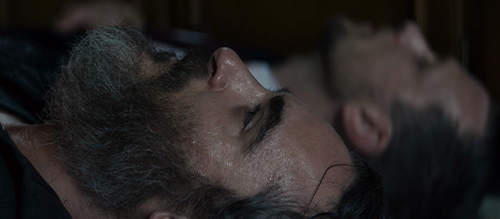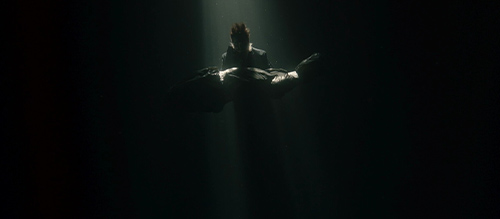How Music Reframes the Violence in You Were Never Really Here
Lynne Ramsay’s 2018 psychodrama, You Were Never Really Here, doesn’t explicitly use the music of Aphex Twin, but its mood and score, composed by Jonny Greenwood, rely heavily upon it. A harrowing story of a contract killer tasked with rescuing a girl from a pedophile ring, the Joaquin Phoenix-led thriller is a balanced, troubling film, more straightforward than Ramsay’s previous work, and with meditative lapses in action that leave as much of a pit in your stomach as watching Phoenix beat someone down. For Ramsay, it was the spirit of an Aphex Twin song “#3” that inspired her, citing “a shot in the film where there’s a girl in the street and she’s crying… I played [“#3”] for Joaquin and we were looking at the shot and we were both mesmerized.” Some of the boldest shots in We Need to Talk About Kevin, Ramsay’s Tilda Swinton-starring breakthrough, are without music, relying totally on an actor’s face. Really Here is darker and more minimalist by comparison: a shot of blood catching in Joe’s (Phoenix) sprawling gray beard is unceremonious. Not quite flat, but without the pomp one might expect when the script calls for blood to be splattered on the leading man’s money-maker. Stepping in for the lack of visual drama, music elevates the scene: Greenwood’s score lurches into the shot just as Joe’s face is painted dark red, light synth drums picking up the pace just as the audience is given a taste of the odds Joe is up against.
Powerful outside forces reclaim the girl Joe rescues, and after narrowly surviving an encounter with heavily-armored hit-men, Joe realizes his mother may be in danger. He visits her house to find her shot in bed, a pillow over her face for a silencer. Memories of a violent childhood flash on screen, replicating the thoughts and regrets that barge into Joe’s mind at a moment’s notice. He’s a war veteran, and former FBI agent, alluding to both his current mental state and a past of failed attempts to channel his violent skills into legal contexts. Rather than fly into a rage after seeing his mother, however, he makes his way calmly down the stairs and into the kitchen, where the two killers are idling. Joe draws, shoots one, then the other, but the second man doesn’t die right away. Joe leans over him and demands information; he gives it to him, and so on, but in a change of mood, Joe kneels down and offers the man a painkiller. He lays on the ground to hold his hand, the kitchen tile turning a distorted shade of crimson, and the killer takes his final breaths. The audience knows that Joe wasn’t shot, but the image of his body lying on the ground next to the near-lifeless assassin suggests he isn’t far from death. The camera lingers over their necks and hands as they sing along to the radio, and with no score from Greenwood, their humanity is seen in a shared knowledge of Charlene’s “I’ve Never Been to Me”, the perfect soundtrack for the moment: a song each of them know too well, drawing yet another line from Joe to the man bleeding on the floor. There’s a certain level of empathy to every scene in the film, but seeing as Joe was cracking a pedophile’s skull to rescue a girl not twenty minutes earlier, it’s easy to feel caught off guard by this tender moment. A life in the military and FBI has trained him to kill without emotion, but it’s also confirmed the rarity of a chance to make things right. The men’s roles could easily be reversed, Joe bleeding on the floor, with a song about the deceptive nature of paradise to play him out, and Ramsay’s decision to have him pause and lie down with this man, singing this song, creates that moving effect.
A more subtle borrowing of musical motifs comes in an underwater burial Joe performs for his mother. To this point, Greenwood’s score has primarily kicked in to bolster a scene: Joe gets covered in blood, and a beat drops in to highlight his surprise, or he prepares materials for a rescue while light synths accentuate a montage. For the burial scene, a softer touch is required. Wrapped in a black trash bag, Joe attaches rocks to his mother’s makeshift coffin and walks her into a lake, himself dressed in a suit and tie. She begins to sink, but Joe has placed rocks in his own pockets as well, and only after recalling the uncertain fate of the girl he rescued does he dig them out and swim to the surface. Compared to the way Greenwood’s score is used in other scenes, the music here capitalizes on multiple emotions, emphasizing the uncertainty of the future, the mother’s death, and Joe’s possible rebirth. The song used here, “Tree Synthesizers”, is Greenwood’s homage to “#3”, constructed around two back-and-forth chords that resolve in a third, like the feeling of stepping onto dry land after a day at sea. This could be Joe’s funeral, and the music seems to encourage it; there’s nothing to bolster, just a rocking sense of finality, yet the presence of the resolving third chord contains margin for something else: it could be an exasperated sigh, the end of a life of pain and endless regret. Or, it could be a step in a new direction, something that provides freedom from a clinging past. Joe’s mind turns to the girl, now in the hands of the same people who killed his mother, bound to end up right where she was before Joe found her. His decision is made, and as Joe claws to the surface, he appears renewed. Really Here isn’t a precisely “healing” film, but with moments like this, there’s no better descriptor.
At the crossroads between life and death, past and future, a song has immense emotional power. “Tree Synthesizers” isn’t just any song, either, but a finely tuned microcosm of Joe’s existence: back and forth, with only temporary moments of reprieve. You Were Never Really Here will long be remembered for the way it dodges convention in individual scenes, but with every one of these moments there is applicable music, meant to bolster or break up the violence so that Joe’s journey is more than a straight line to revenge. He is jagged, bothered, and quintessentially “messed up”, and a score that challenges his tenderness and rage is a unique way to soundtrack such a film, dialoguing with Joe’s tortured humanity rather than admonishing or glorifying it. For as violent as it is, You Were Never Really Here is a calming experience.
Written by Cole Clark
You can support Cole Clark in the following places:
Twitter – @colelclark



